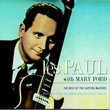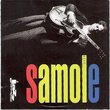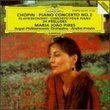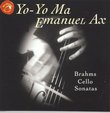| All Artists: Franz Liszt, Alexander Scriabin, Sergey Rachmaninov, Robert Schumann, Arcadi Volodos Title: Arcadi Volodos Live at Carnegie Hall Members Wishing: 0 Total Copies: 0 Label: Sony Release Date: 10/5/1999 Genres: Special Interest, Classical Styles: Marches, Chamber Music, Forms & Genres, Sonatas, Historical Periods, Classical (c.1770-1830), Modern, 20th, & 21st Century Number of Discs: 1 SwapaCD Credits: 1 UPC: 074646089323 |
Search - Franz Liszt, Alexander Scriabin, Sergey Rachmaninov :: Arcadi Volodos Live at Carnegie Hall
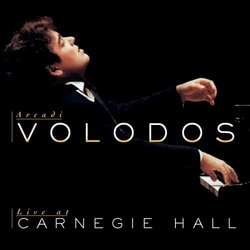 | Franz Liszt, Alexander Scriabin, Sergey Rachmaninov Arcadi Volodos Live at Carnegie Hall Genres: Special Interest, Classical
The only applause not left edited out of this recording of Arcadi Volodos's Carnegie Hall debut recital--given on October 21, 1998--comes after his house-burning encore of Liszt's maniacally florid variations (à ... more » |
Larger Image |
CD DetailsSynopsis
Amazon.com The only applause not left edited out of this recording of Arcadi Volodos's Carnegie Hall debut recital--given on October 21, 1998--comes after his house-burning encore of Liszt's maniacally florid variations (à la Horowitz) on the famous Mendelssohn "Wedding March." But the volley of enthusiastic cheers and wallops that ensues is enough to register the charismatic spell this young Russian pianist must have cast over his audience. Only in his mid-20s, Volodos seems to channel a bygone era of the Russian variety of Romantic virtuosity in its dual aspect, from hyperathletic prowess to exquisitely poised lyrical refinement. The recital opens with dazzlingly calibrated fireworks for Liszt's 15th Hungarian Rhapsody ("after Vladimir Horowitz," with whom Volodos justifiably invites comparison--as he did on his spectacular debut album--for his sinewy, larger-than-life negotiation of its thunderous octave runs and tangle of skittering flourishes). A far different world is brought to life in the enigmatic, compressed motivic echoes of the Scriabin pieces. The multiply trilled outbursts of ecstatic transport in his Sonata No. 10 beckon and dissipate like voluptuous hallucinations. Volodos can master the kind of interior poetry--breathtaking in its simple eloquence--needed for the two Rachmaninoff Études-tableaux. So too the aching, barely achieved tranquillity Schumann calls for in the most introspective of the "Bunte Blätter." Indeed, the variety of tonal color, warm legato, playful animation, and fully voiced harmonies Volodos brings out suggests the "varicolored leaves" of the collection's title. This is pianistic poetry that lingers long in the mind's ear, as it undoubtedly did for the lucky audience that night in Carnegie Hall. --Thomas May Similarly Requested CDs
|
CD ReviewsInteresting repertoire Norman Duffy | Amsterdam | 11/28/2002 (5 out of 5 stars) "I felt tempted to write this short piece after reading some of the other comments about this disc. Someone of the oversized temperament like this guy is probably always going to fire different reactions in different people.Undoubtedly the repertoire choices here are audacious but to not be able to get beyond that in order to expand one's knowledge and experience is a great shame. This is particularly the case when the performances are of a quality such as they are here. I can understand that Scriabin is a bit of an unknown quantity to many but I also think that he will only remain unknown to those who do not want to know.This is a superb recital and the centrepiece is the Schumann - how obscure is that?" Masterful Recital Frederic Sala | Detroit, USA | 01/30/2002 (5 out of 5 stars) "Arcadi Volodos is one of the great pianists of our era. In this album, his Carnegie Hall Debut, he presents a wonderful selection of pieces through which we can discover what he is as a pianist. The disc contains the tumultuous Liszt-Horowitz Hungarian Rhapsody nr. 15 (Racokzy March), a selection of short works by Rachmaninoff, several Scriabin pieces including the Sonata nr. 10, and the Schumman "Bunten Blatter (Leaves of Different Colors)The Schumman is rarely heard and masterful. It concludes with the powerful Gewindenmarschen, which is followed by the formidable Liszt/Mendelson/Horowitz "Wedding March Variations". Volodos plays through these pieces with a stunning technical perfection and honest, not exaggerated, emotion. While some claim he has no feeling, it is the opposite, he can conjure many feelings without exaggerated playing. My only complaint is where are the rest of the pieces? The programme was actually 2 hours long, and concluded with a wonderful transcription Glinka transcription by Volodos." Volodos is the heir and superior of Horowitz Mr. Burke | Miami, Florida | 09/25/2005 (5 out of 5 stars) "Time will tell the whole tale but based on this recording Mr. Volodos must be considered one of the greatest pianists to have ever played the instrument. It is interesting to me that much of the criticism that has been leveled against the man comes from a music establishment whose members and stars are plainly unable to play such pieces with anything close to the same speed, precision, and power. They simply can't do it and so they chide the one who can; the one whose talent exist on a higher plain than their own. And yet the way Mr. Volodos plays such masterpieces somehow rings true to the original intent of the composers. Without question that is true of Liszt whose works for solo piano have seldom, if ever, been played convincingly since Cziffra, similarly scorned by a less-talented establishment, dazzled those whose egos would let them truly hear. Poor Earl Wild and Andre Watts must be quaking in their mediocrity to hear such greatness. The grotesquely oversold Lang Lang must be hiding under a table somewhere, sure that the world has found him out. Don't worry guys; the establishment can't recognize greatness without seeing their own lack of it. There is little chance of that happening. As of today, 9/25/05, I ask of Sony Classical, where is Mr. Volodos? Where is the newsletter promised on his website? Where is his itinerary? He recently played the Far East yet Sony refused to even notify his info-starved fans. Why isn't he promoted? Volodos, you need another label. You need representation, promotion, exposure. Please come to the USA! Every time I listen to my worn old recordings of the great Cziffra my heart cries out: Where is Arcadi Volodos?
" |

 Track Listings (23) - Disc #1
Track Listings (23) - Disc #1

